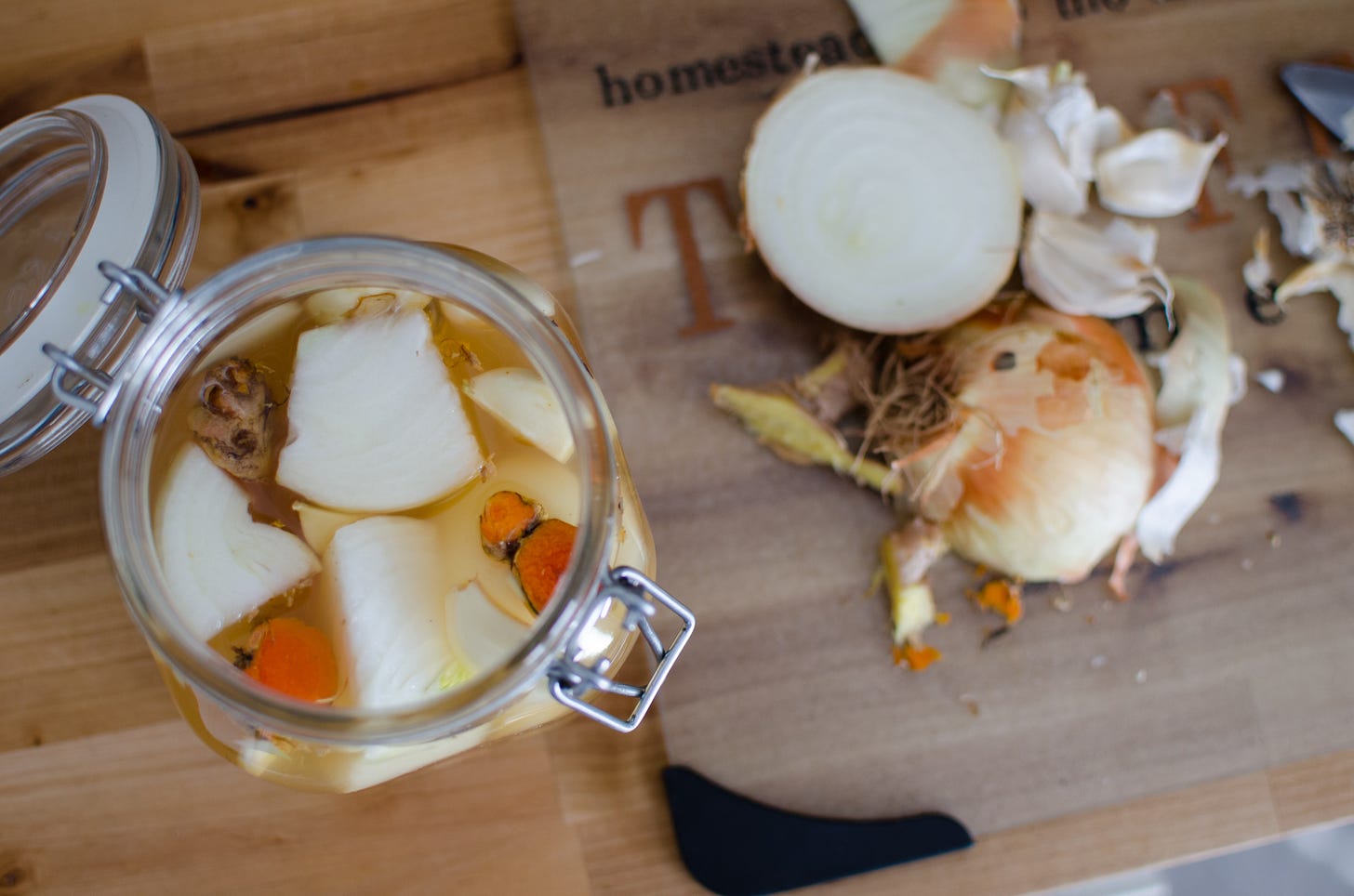Homemade Fire Cider | Sometimes It Works, Sometimes it Doesn't
A Gut & Immune Supporting Remedy (with recipe)
I was recently asked the question why sometimes fire cider works, and sometimes it doesn’t. It’s a valid question, and one that I enjoy answering as an herbalist. For years, fire cider was one of those remedies that would never work for me, but worked wonders for my husband and others in our family. So, why was that?
First, we have to take a look at what fire cider actually is. Let’s break down the ingredients in fire cider, what they do, how they work, and how acidity levels in the gut are the real reason for its efficacy (or inefficacy).
What Is Fire Cider?
Fire cider is technically an oxymel in the herbal and natural health world. This is went we ferment together raw apple cider vinegar, raw honey, and various herbs, fruits, rhizomes, etc.
In the case of fire cider, the basic ingredients are raw apple cider vinegar, raw honey, ginger root, turmeric root, horseradish root, onion, garlic, jalapeño or cayenne peppers (or another type of hot pepper), and lemons (or another citrus). Many people add other things like thyme, oregano, or additional citruses and peppers.
Fire cider has historically been used to help heal and clear the sinuses (since it helps open airways), for acid reflux, and for gastrointestinal issues. These are the most common issues it has been used to improve. It has also been used for sore throat and fungal infections.
Does Fire Cider Boost the Immune System?
Many people believe that taking fire cider every day can help boost the immune system, or get rid of the common cold or flu, but that’s not really what fire cider was created to do. Can it help improve the digestive tract, therefore improve the immune system?—absolutely! And this is where we get into “sometimes it works, sometimes it doesn’t.”
If you are taking fire cider to help decrease the duration of the common cold and flu, it probably won’t work that way. But, it will help decrease the inflammation in your sinuses, and help your gut. It is not, however, a fever reducing, virus fighting herb like elderberry or astragalus.
So what is fire cider best at doing?
helping clear the sinuses through opening the airways and breaking down of mucus (cayenne, horseradish, onion, turmeric, raw honey)
relieving and improving sore throat (all ingredients, but especially cayenne)
improving blood flow and circulation throughout the body (cayenne, garlic, turmeric)
helping fight bacterial and fungal infections (all ingredients, but especially garlic, raw honey, apple cider vinegar)
helps decrease inflammation (cayenne, horseradish, turmeric)
improving the acidity of the gut to improve acid reflux symptoms (all ingredients)
improving overall gut health (all ingredients)
Since over 80% of your immune system is within, or connected to, your digestive tract, making sure your gut is at its healthiest does, in fact, improve your immune system. But fire cider alone does not give you a temporary immune system boost.
So, ultimately, taking fire cider as a preventative every day is absolutely worth it. Not only does it improve digestive function, it helps with circulation, inflammation, and more.
Use this oxymel to help aid in longterm systemic support. Or use it short term for inflammation, sinus infections, acid reflux, or digestive upsets.
Fire Cider Recipe
½ cup fresh ginger root, peeled and cut
¼ cup fresh turmeric, peeled and cut
½ cup fresh horseradish root, peeled and cut
½ cup onion, peeled and diced
¼ cup minced garlic
½ cup jalapeno or cayenne peppers, chopped, seeds in
Zest and juice of 2 lemons (measure liquid if possible)
3-4 cups Organic Raw Apple Cider Vinegar (with the mother)
Raw Organic Honey
Method:
In a quart size mason jar, add all dry ingredients, plus lemons.You can place a fermenting weight on top of your dry ingredients, or you can leave them be. However, they may float.
Add 3-4 cups of raw apple cider vinegar to your quart jar. This will most likely fill your jar almost completely to the top. Leave a 1 inch headspace, as some of your root herbs may expand. If you don't have enough room in the jar, you can just add enough that it covers the ingredients, or you can transfer to a bigger jar.
Cap the jar tightly with a plastic screw top, shake well, set jar in your pantry or in a place out of direct sunlight and extreme temperatures. Allow your fire cider to macerate for 4 weeks, shaking once each day.
After 4 weeks, strain your liquid into a new glass jar and dispose of the herbs. Add up to 1 cup of honey, or more, until you reach the desired taste and consistency. Label with name, ingredients, and date.
This extraction is best kept in the refrigerator for extended shelf life.







Is there a recipe for younger children that is just as effective but not as spicy? I’d love to have something I can give my 5 1/2 year old. Thank you!